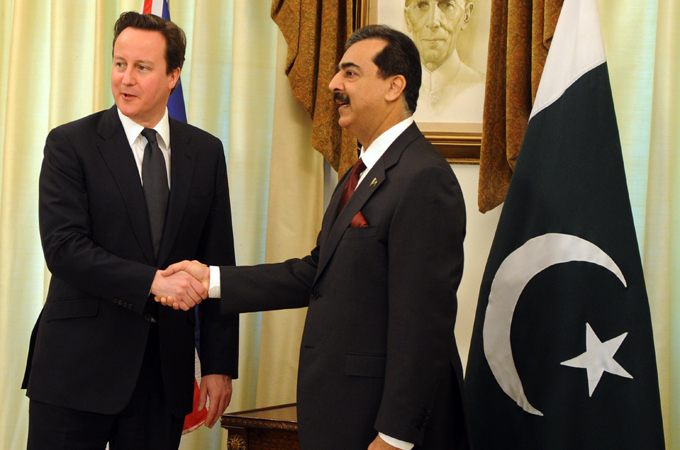British PM seeks ‘fresh start’ with Pakistan
Cameron hopes to soothe tensions caused by claim last year during visit to India that Pakistan sponsored terrorism.

 |
| The two leaders were due to discuss how they can cooperate more on security [AFP] |
David Cameron, the British prime minister, is visiting Pakistan, seeking a “fresh start” in relations with Islamabad, nine months after accusing it of turning a blind eye to terrorism.
In his day-long trip on Tuesday, his first to the nuclear-armed country since taking office in May 2010, Cameron hopes to soothe tensions caused by his remarks during a trade visit to India.
Diplomatic row
In a speech in Bangalore last July, Cameron said Pakistan had promoted “the export of terror”. However, Asif Ali Zardari, Pakistan’s president, papered over the row in a visit to London the following month, when he and Cameron said their ties were “unbreakable”.
Cameron will repeat the message on Tuesday and discuss with Yousuf Raza Gilani, Pakistan’s prime minister, what Pakistan is doing to combat religious extremism in the tribal belt on the Afghan border.
The two leaders will also discuss how they can cooperate more on security.
Jonathan Evans, Britain’s domestic intelligence chief, said last year that 50 per cent of serious plots linked to al-Qaeda in Britain emanated from Pakistan’s tribal areas, down from 75 per cent two or three years ago.
Officials have attributed the fall to greater action against militants, but also to new threats coming from countries such as Somalia and Yemen.
According to pre-released extracts of the speech, Cameron is expected to tell an audience of university students, “Let’s today make a fresh start in our relationship.
“Let’s make this the start of a new era in the relations between our countries, our governments, our peoples,” he will add.
“Let’s clear up the misunderstandings of the past, work through the tensions of the present and look together to the opportunities of the future.”
‘Shared expertise’
In an agreement to be signed by the two prime ministers, the countries will agree to set up a centre to share expertise on countering roadside bombs, which pose a major threat to British troops in Afghanistan.
The war in Afghanistan, where Britain has about 9,500 soldiers, will also be discussed with British officials keen to build on what they see as Pakistan’s growing involvement in a process of political reconciliation there.
Tuesday’s talks also involve John Sawers, the head of Britain’s MI6 spy agency, and David Richards, its military chief.
And from the Pakistani side, Ashfaq Kayani, Pakistan’s army chief and Ahmad Shuja Pasha, head of intelligence will participate in the talks.
“Whether it’s relations with India, our security or questions of governance, if we work closely with one another, if we’re clear that we need each other to succeed, we can grasp these difficult issues and move beyond them to a better future,” Cameron is expected to say.
Boosting trade
Cameron will also seek closer ties on development, trade and cultural ties, before rounding off his trip with a meeting with Zardari.
“We want a strong relationship with a secure, prosperous, open and flourishing Pakistan,” the British premier will say in his speech.
Cameron and Gilani would pledge to boost trade from £1.9bn a year to £2.5bn a year by 2015, British officials said.
Cameron will also announce a new investment of up to £650m over the next four years to get four million Pakistani children into education.
The money will train 90,000 teachers, buy six million new textbooks and build or refurbish 8,000 schools.
Security arrangements
Meanwhile, Al Jazeera’s Pakistan correspondent, Kamal Hyder, reported from Islamabad that British security specialists arrived in the capital, heavily loaded with modern equipment late on Monday.
They will take charge of the security arrangements made locally for David Cameron’s visit.
Shooters will also be deployed on rooftops of buildings along the route.
Hamid Mukhtar Gondal, regional police officer (RPO), said that “special security measures, usually put in place for the visiting heads of state, are being made for the British prime minister.
“They will bring their own security but local police and security personnel are also being deployed,” the RPO said.